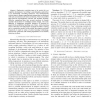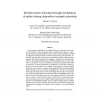71 search results - page 5 / 15 » Intrinsically Motivated Reinforcement Learning |
GECCO
2006
Springer
13 years 11 months ago
2006
Springer
This paper investigates reinforcement learning (RL) in XCS. First, it formally shows that XCS implements a method of generalized RL based on linear approximators, in which the usu...
IJCNN
2008
IEEE
14 years 2 months ago
2008
IEEE
— Exploratory activities seem to be crucial for our cognitive development. According to psychologists, exploration is an intrinsically rewarding behaviour. The developmental robo...
SOCROB
2010
2010
Using the Interaction Rhythm as a Natural Reinforcement Signal for Social Robots: A Matter of Belief
13 years 6 months ago
Abstract. In this paper, we present the results of a pilot study of a human robot interaction experiment where the rhythm of the interaction is used as a reinforcement signal to le...
ATAL
2009
Springer
14 years 2 months ago
2009
Springer
Reinforcement learning algorithms that use eligibility traces, such as Sarsa(λ), have been empirically shown to be effective in learning good estimated-state-based policies in pa...
NECO
2007
13 years 7 months ago
2007
The persistent modification of synaptic efficacy as a function of the relative timing of pre- and postsynaptic spikes is a phenomenon known as spiketiming-dependent plasticity (...


